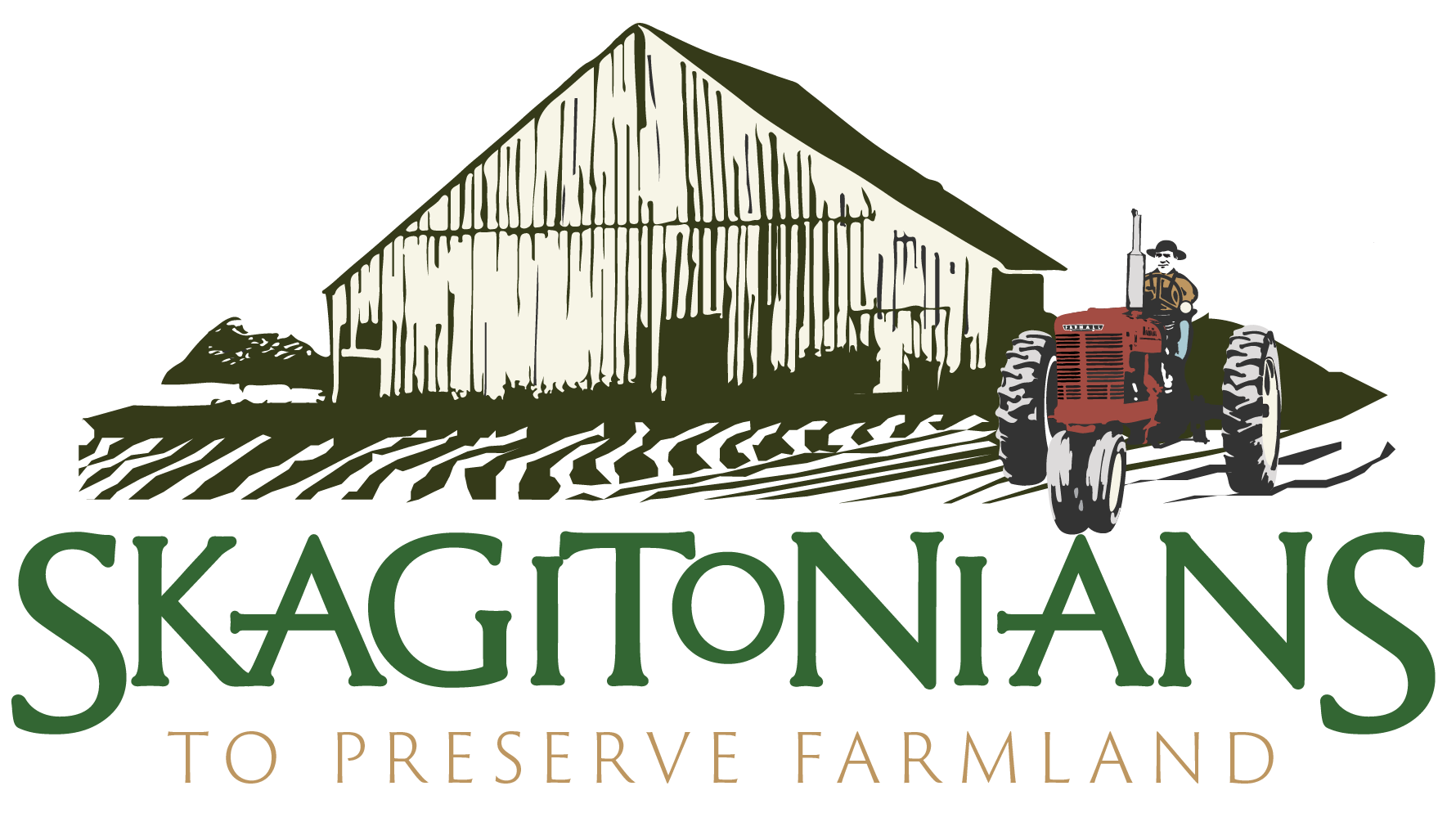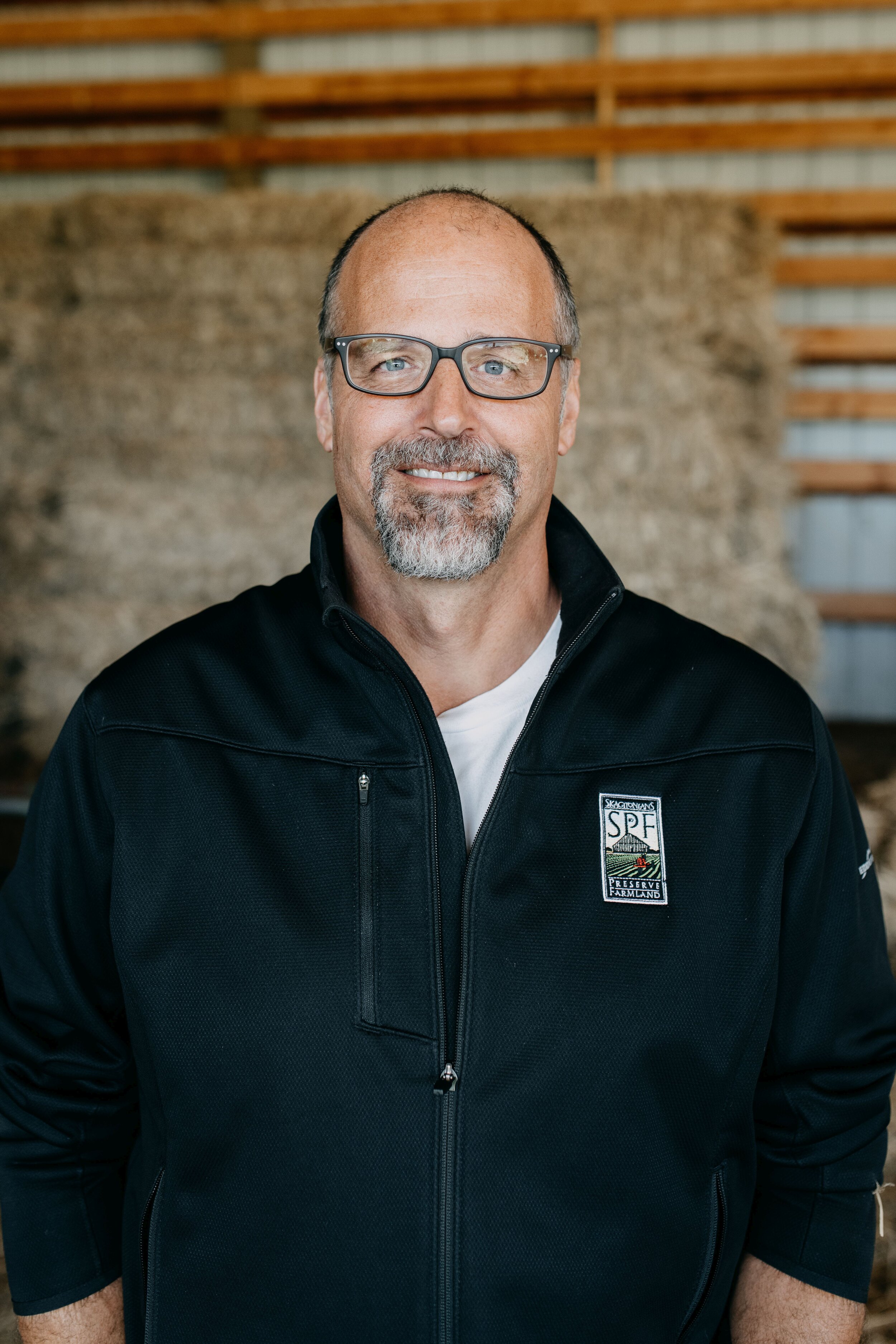From Allen's Desk
Welcome to From Allen’s Desk - a look at what’s happening in the world of Skagitonians to Preserve Farmland.
WATER
Late last year, SPF, in collaboration with the Skagit Drainage and Irrigation Districts Consortium (Consortium), formed and launched the Skagit Ag. Water Advisory Group (SaWAG) to help advise our participation on the Washington State Joint Legislative Task Force (Task Force) for water supply on the Skagit River.
The SaWAG holds monthly meetings facilitated by Lyn Wiltse of PDSA Consulting. PDSA Consulting is one of only a few firms with in-depth experience in water-related natural resource issues. PDSA Consulting has been working on complex agricultural and natural resource issues with SPF and other community partners since 2009 and we are very pleased to have Lyn’s experience to help guide our complex conversations.
SaWAG members currently include Terry Sapp of Hoen Bend Farms, Jennifer Schuh of Schuh Farms, Steve Elde from Drainage and Irrigation District 15, Brad Smith of S&B Farms, Michael Frazier of Viva Farms, Darrin Morrison of Morrison Farms, Jason VanderKooy of Harmony Dairy, and Gary Jones from Western Washington Agricultural Association.
SaWAG currently works to guide SPF’s participation on the Task Force specifically, and to help identify water supply issues and potential short-, mid- and long-term solutions and strategies.
SPF is posting studies and reports related to the work of the Task Force and Skagit agricultural water supply on the new Studies & Reports section of our website.
A key deliverable of the Task Force was completed this past January: an independent peer review by the Washington State Academy of Sciences of the original 1999 study and report that led to the 2001 Skagit Instream Flow Rule.
One of the Academy’s many findings showed better science and analytical tools now available to evaluate the tidally influenced zone of the Skagit River to better inform water supply and availability.
The Skagit River is the only river where Ecology has applied an instream flow rule to a tidally influenced section, and below a gauge used as a point of compliance.
The methodologies used in 1999 to evaluate water supply are unique to the Skagit, have never been peer reviewed, and are not recognized as a standard scientific methodology for the purposes of establishing an instream flow rule.
In all other Washington State rivers the instream flow rules are applied to free-flowing sections in accordance with a generally accepted and peer reviewed scientific method, the Instream Flow Incremental Methodology. Read about this in The Dirt Issue #57 – The Skagit Instream Flow Rule.
AGRITOURISM
After three years of advocacy, we are pleased to see Skagit County’s Department of Planning and Community Development Services and their consultant, Berk Consulting of Seattle, fully engaged and working to assess the current state of agritourism in Skagit County.
They plan to develop a suite of potential legislative actions to address the burgeoning growth of tourism-related activities within Skagit County’s agricultural industry in a way that allows farms of all scales to prosper while preventing and mitigating the negative impacts related to tourism.
This is critically important: Skagit County, in their Agritourism Situation Assessment report on county agritourism, has found many cases where county policies and regulations have not kept up with the many new uses and activities happening now within our farmed lands—some of which may lead to the loss of farmland, incompatibility and interference with surrounding agricultural operations, traffic impacts, and other unintended consequences.
The SPF Board of Directors is studying the issue carefully and engaging with the farming and non-farming communities to better understand the issues and opportunities with the intent to help develop fair and informed positions on the issue.
To date we have conducted three facilitated community forums with farmers, farmers engaged in agritourism activities, and non-farmers. We plan to hold another forum this summer.
Some of the critical questions the Board is considering include:
What is the difference between rural tourism and farm tourism?
Most commonly, rural tourism is associated with the “country vacation” where tourists spend the majority of their vacation engaging in recreational activities in a rural environment—whether at a farm, ranch, country home, or in surrounding rural areas.
“Farm tourism” is explicitly farm-related and is usually associated with tourists staying at a farm accommodation and/or seeking experiences from a working farm operation.
“Agritourism” could then be thought of as the crossroads between rural tourism and farm tourism.
Regardless of the exact terminology, the SPF Board believes any definition of agritourism should include the following five factors:
Be tied to an existing on-site farming operation
Attract members of the public to visit a working farm operation
Is not a detriment to surrounding agricultural operations and/or practices
Is designed to supplement existing farm income
Provide recreation, entertainment, and/or educational experiences to visitors that promotes and enhances Skagit Agriculture overall
In 2009, Skagit County established the legal foundation and precedent that building a single-family residence within Ag.-NRL-zoned lands of Skagit County requires proof of farming activity, meaning single-family homes are an accessory to the primary use of farming within this zone.
The SPF Board believes this is a foundational legal basis for how to deal with other accessory uses within the county’s Ag.-NRL-zoned lands, such as agritourism.
We know a lot more work is needed to better understand what agritourism can bring to Skagit County—including unintended consequences. The SPF Board is committed to supporting policies and regulations that will support and protect all scales and types of farms in Skagit County for generations to come.
We look forward to keeping you, our members, and the community updated as we continue to engage in and participate in the county’s public processes going forward.
SKAGITONIANS DO PRESERVE FARMLAND!
We are very pleased to share that two projects we have been working on with Skagit County’s Farmland Legacy Program and the landowners are in the process of closing!
First, our three-year effort with the Dunton family will permanently protect 172 acres near La Conner. The Skagit County Board of County Commissioners approved the project in January.
Second—and arguably one of our most complicated and most rewarding projects to date—we are finalizing the 385-acre Pierson Family project at the Cook Road freeway interchange just north of Burlington. The Skagit County Board of County Commissioners approved the project in February.
The permanent protection of farmland at this busy freeway interchange is especially meaningful to the SPF Board, both past and present: this farm was slated to be developed into a major theme park, sparking the creation of Skagitonians to Preserve Farmland 32 years ago.
We will be sharing more details and information in the coming weeks!
INFARMATION PROGRAMS
We are pleased to announce that with support from Puget Sound Shell, Marathon, and Northwest Farm Credit Services, our Youth InFARMation Farm Tours will resume this spring with a new self-guided farm tour created by participating schools and farms.
Participating classrooms will receive kits with learning activities related to STEAM education (science, technology, engineering, arts, mathematics). Using QR code technology, students will be able to scan a QR code at a participating farm, watch videos about the farm, and get clues about completing the educational kit’s activities.
We see this program continuing as a supplement to our physical farm tours moving forward.
EMERGING ISSUES
SPF keeps an eye out for emerging issues that directly and indirectly affect Skagit agriculture. Here are some of the issues we started tracking during the first quarter of 2021:
Skagit County has combined three years of docket requests (proposals and requests for Comprehensive Plan Amendments and/or Development Code amendments). See the full combined list of proposed amendments HERE.
Skagit County Department of Planning and Community Development Service’s community survey on agritourism is still open, so if you haven’t already, take the survey HERE.
The three dams in Skagit County, owned and operated by Seattle City Light, are undergoing a renewal of their federal licenses. The last license renewal was 25 years ago. SPF is following the process and staying connected through the participation of the Skagit Drainage and Irrigation Districts Consortium. Skagit County is represented by the Skagit County Prosecuting Attorney’s Office. Read the most recent comments by Skagit County HERE.
A THOUSAND CUPS OF TEA
In any given week, a majority of our effort is invested in meetings, especially with groups of similar—as well as competing—interests. Some groups SPF has engaged with over the past three months include:
Drainage & Irrigation District representatives
Washington State Department of Agriculture
Skagit County
Western Washington Agricultural Association
NOAA Restoration Office
Washington State Department of Fish & Wildlife
Skagit County’s Farmland Legacy Program
Skagit County Planning & Development Services
Skagit Valley Value-Added Agricultural Innovation Partnership Zone
Port of Skagit
Numerous farms, farmers, and community members
We are grateful for the support of our SPF members and community as a whole as we work together to protect and preserve Skagit farmland and farming—and all that comes with it!
From all of us at SPF, we hope and trust you and your families are and remain safe.
With Gratitude,



